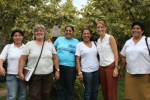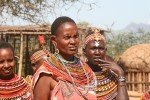Research Projects
Although it is well documented that globalization - or the restructuring of the world economy of the 1980s and 1990s - had inequitable and negative consequences for women’s health and human rights, social actors from diverse local contexts demonstrate that women are not mere victims, but rather have worked actively to resist oppression and promote women’s well being worldwide. Because a major consequence of globalization has been the exacerbation of structural factors that contribute to rising levels of gender inequality, marginalization, and poor health, we need a more complex understanding of how women’s agency and activism can lead to the actualization of women’s rights in the context of globalization. My research integrates theory and methods from social and community psychology with those of sociology, geography, and women's studies to investigate how social structures, which position women in a subordinate status relative to men, impact the health and safety of women’s bodies and how community-based organizations and collective action and contribute to change. My program of research has been funded by NIH, NSF, and several internal and system-wide UC grants.
The projects listed below are completed. My current collaboration is within the women's movement in Perú (initially via the Flora Tristán Women's Center - one of the most prominent women’s organizations in Perú). Together we completed a testimonio project that examined feminist activism in Perú through an oral history analysis of leaders whose life’s work has been promoting justice for women. Currently we are working on a book manuscript that documents how a coordinated campaign addressing gender inequality successfully passed equity legislation (i.e., a Parity Law) meant to facilitate women's political participation and access to power through decision-making.
I have completed these projects (detailed in the tabs below) with community partners that investigate the consequences of structural inequities on women’s wellbeing:
- an examination of the role of land ownership in empowerment processes and gender-based violence in Nicaragua
- an investigation of land ownership, civic participation, and violence among women in Tanzania
- an oral-history analysis of the role of grass-roots social movement in promoting justice for women in Nicaragua.
Nicaragua Women’s Social Movement
Built on my initial phase of research in Nicaragua, this collaborative project, brings together social science and grass roots community advocacy with a focus on documenting how the women’s movement in Nicaragua profoundly challenges systemized gender inequities. Although the women’s movement in Nicaragua is often linked to the political struggle of the Sandinista Revolution, by… Continue Reading Nicaragua Women’s Social Movement
Land Ownership, Civic Participation & Violence among Women in Tanzania
Throughout East Africa, and in Tanzania in particular, domestic violence is widespread. Rates are especially alarming in rural areas, where culturally sanctioned violence, combined with low levels of formal education, leave women in subordinate positions with little knowledge of their rights. In a similar project to that described in Nicaragua, I aimed to replicate and… Continue Reading Land Ownership, Civic Participation & Violence among Women in Tanzania
Land Ownership, Women’s Empowerment, & Gender-based Violence in Nicaragua








Violence against women is the most pervasive human rights violation in the world. Rapidly changing conditions in the restructuring of resources in “developing” countries provide a perfect context for an analysis of social structures that reflect dominant roles and elevated status that may, in turn, severely limit the amount of control women can exercise over their own bodies. Gender inequity is especially visible within the area of property rights, with pervasive inequities in land ownership being recognized as a violation of women’s rights. My initial research efforts in the area of transnational feminism were directed at investigating how land ownership contributes to a system in which female subordination is sustained and reproduced, thereby increasing women’s risk of violence. Until recently, these two major violations of women’s rights – gender-based violence and property rights – had been addressed independently of each other. In partnership with the Centro de Mujeres Xochilt Acalt, we examined how structural inequities lead to power imbalances and gender-based norms that perpetuate threats to women’s health and safety through an examination of land ownership. Our research was supported by a National Science Foundation Office of International Science and Engineering (grant 0714697).
- Grabe, S., & Grose, R., & Dutt, A. (2015). Women’s land ownership and relationship power: A mixed methods approach to understanding structural inequities and violence against women. Psychology of Women Quarterly, 39, 7-19.
- Grose, R. & Grabe, S. (2014). The explanatory role of relationship power and control in domestic violence against women in Nicaragua: A feminist psychology analysis. Violence Against Women, 20, 972-993.
- Grabe, S., Dutt, A., & Dworkin, S. (2014). Women’s community mobilization and well-being: Local resistance gendered social inequities in Nicaragua and Tanzania. Journal of Community Psychology, 42, 379-397.
- Grabe, S. (2012). An empirical examination of women’s empowerment and transformative change in the context of international development. American Journal of Community Psychology, 49, 233-245.
- Grabe, S. (2010). Promoting gender equality: The role of ideology, power, and control in the link between land ownership and violence in Nicaragua. Analyses of Social Issues and Public Policy, 10,146-170.
- Grabe, S. (2010). Invited chapter: Women’s human rights and empowerment in a transnational, globalized context: What’s Psychology got to do with it? In M. A. Paludi (Ed.), Feminism and Women’s Rights Worldwide. (pp. 17-46). Westport, CT. Praeger Publishers/Greenwood Publishing Group.

